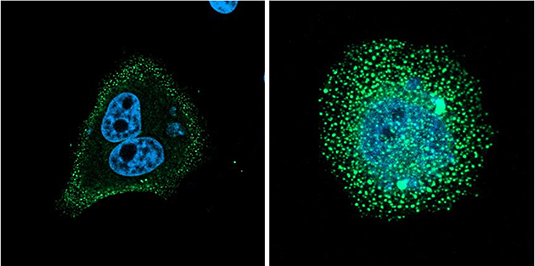Rare diseases
Key insights from small samples
27.02.2020
The study of a rare genetic disease has enabled a team led by LMU’s Christoph Klein to uncover the role of a membrane-associated protein in the development and function of human T cells.

Micrographs showing that the normal FCHO1 protein aggregates in clusters on the cell membrane (left), while the mutant form is found in large, randomly distributed clumps within the cell (right). Source: Klein/LMU/NComms
All biological cells are bounded by a lipid bilayer known as the plasma membrane. In addition, the cells of higher organisms contain specialized intracellular membrane compartments, which interact with each other and with the plasma membrane. The highly dynamic functional interplay between these membrane systems plays a vital role in many biological processes, and is essential for normal cell function and survival. A new report published by group of researchers led by Christoph Klein (Professor of Pediatrics at Dr. von Hauner’s Children’s Hospital, which is part of the LMU Medical Center) throws new light on the action of a key component of this network, and uncovers its significance for the development and function of human T cells. The new findings appear in the online journal Nature Communications.
More information please visit LMU.de/news
Original Publication:
Human FCHO1 deficiency reveals role for clathrin-mediated endocytosis in development and function of T cells.
Łyszkiewicz, M., Ziętara, N., Frey, L., Pannicke U., Stern M., Liu Y., Fan Y., Puchałka J., Hollizeck S., Somekh I., Rohlfs M., Yilmaz T., Ünal E., Karakukcu M., Patiroğlu T., Kellerer C., Karasu E., Sykora KW., Lev A., Simon A., Somech R., Roesler J., Hoenig M., Keppler O.T., Schwarz K., Klein C. Nat Commun 11, 1031 (2020). https://doi.org/10.1038/s41467-020-14809-9

